 Petzlover
Petzlover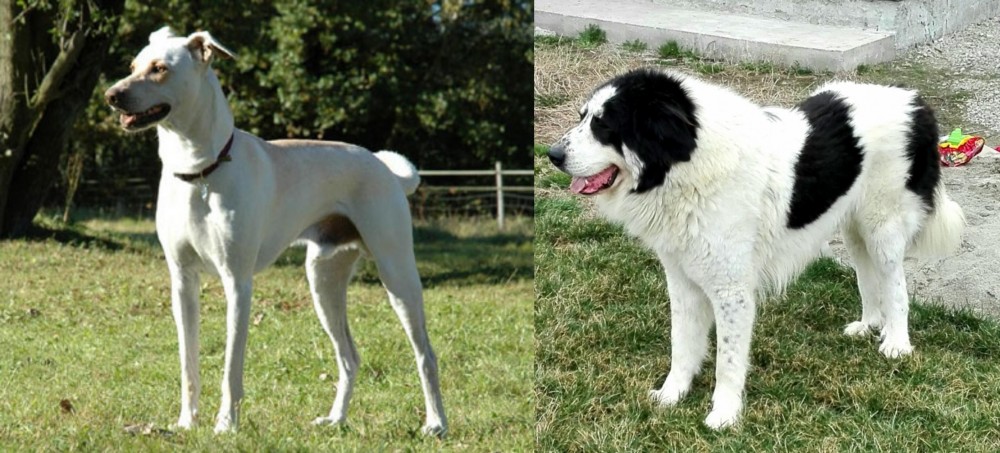 Cretan Hound is originated from Greece but Ciobanesc de Bucovina is originated from Romania. Cretan Hound may grow 10 cm / 3 inches shorter than Ciobanesc de Bucovina. Cretan Hound may weigh 60 kg / 132 pounds lesser than Ciobanesc de Bucovina. Both Cretan Hound and Ciobanesc de Bucovina has almost same life span. Both Cretan Hound and Ciobanesc de Bucovina has almost same litter size. Cretan Hound requires Moderate Maintenance. But Ciobanesc de Bucovina requires High Maintenance
Cretan Hound is originated from Greece but Ciobanesc de Bucovina is originated from Romania. Cretan Hound may grow 10 cm / 3 inches shorter than Ciobanesc de Bucovina. Cretan Hound may weigh 60 kg / 132 pounds lesser than Ciobanesc de Bucovina. Both Cretan Hound and Ciobanesc de Bucovina has almost same life span. Both Cretan Hound and Ciobanesc de Bucovina has almost same litter size. Cretan Hound requires Moderate Maintenance. But Ciobanesc de Bucovina requires High Maintenance
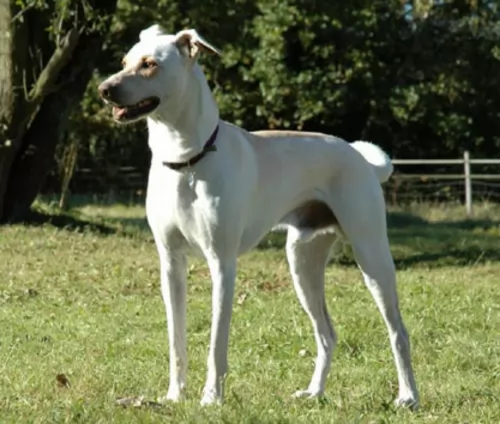 Although the Cretan Hound or the Kritikos Lagonikos is recognized in both Greece and Germany, the hunting dog breed is from the island of Crete, Greece. The dog’s history goes back thousands of years. It is an ancient breed and some believe it is one of the oldest hunting breeds in Europe.
Although the Cretan Hound or the Kritikos Lagonikos is recognized in both Greece and Germany, the hunting dog breed is from the island of Crete, Greece. The dog’s history goes back thousands of years. It is an ancient breed and some believe it is one of the oldest hunting breeds in Europe.
The Cretan Hound has been bred as a working dog, combining sight and scent to track down their prey. Today it is still a rare dog breed that you won’t easily find outside of Crete.
Greece kennels recognize this dog as well as some European kennels, but it isn’t recognized by the American Kennel Club.
 The Ciobanesc de Bucovina is a breed that developed naturally in the Carpathian Mountains (Romania and Serbia) and some regions of Bulgaria. The breed was especially useful in the Romanian northeast regions, the county Bucovina and in the northeastern region of Serbia. These dogs are bred for guarding and herding of flocks as well as guard dogs for the family home.
The Ciobanesc de Bucovina is a breed that developed naturally in the Carpathian Mountains (Romania and Serbia) and some regions of Bulgaria. The breed was especially useful in the Romanian northeast regions, the county Bucovina and in the northeastern region of Serbia. These dogs are bred for guarding and herding of flocks as well as guard dogs for the family home.
When the area was split between Russian and Romania, the dog continued to thrive in the mountains because of the need that the shepherds had for this type of dog with the build, working ability and temperament of the Bucovina.
Finally, in the 20th century, Romania began to urbanize and industrialize. People moved to the cities from the hills and many brought their dogs with them. This allowed many non-mountain Romanians to come into contact with the Bucovina Shepherd for the first time. He became a great family dog and offered guard dog protection as well.
The Romanian Kennel Club accepted the Ciobanesc du Bucovina in 1982 and wrote the first standard then. It has since been updated in 2001 and 2002 with today’s standard. They are not accepted by the international clubs nor the big clubs in the US and Europe. This is one factor in keeping the breed rare because it is little known outside of Romania.
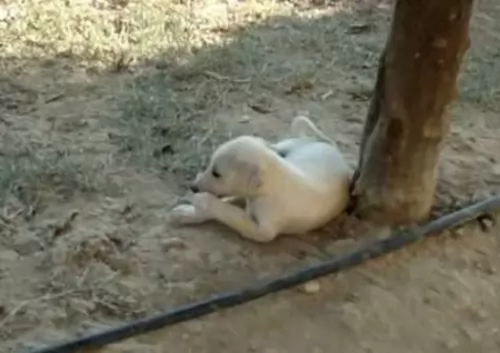 Known for its extraordinary scent abilities as well as its speed, this dog has always been used as a hare hunter because of these skills.
Known for its extraordinary scent abilities as well as its speed, this dog has always been used as a hare hunter because of these skills.
It’s a slender dog of medium to large size and stands at about 60-68cm in height and weighs between 20 – 30kg. It is lean, strong, muscular and swift with a body that is inclined to be longer than tall.
He is slightly heavier than other scenthounds and his ribs aren’t seen. The head is wedge-shaped and the ears drop down, are folded back or can be semi-erect. The eyes are dark and the tail is long and curves upwards with longer hair being found on the tail.
The coat is short and smooth, and coat colors of the dog are varied and can be fawn, sandy, grey, white, black or brindle, and it can be tri-colored too.
The Cretan Hound is alert to sight, sound and scent and when it senses prey, the tail moves in a circular way and the dog becomes rigid for a while before he is off on the hunt.
He is a gentle, intelligent dog, reserved around strangers but making an excellent family pet as he gets on well with all his human family members as well as pets in the house. With good training and socialization, the dog becomes more relaxed around strangers.
He isn’t an aggressive dog, and while he is alert to sounds and smells, he doesn’t make a particularly good watchdog.
 Most large mountain dogs resemble the Bucovina Shepherd, but this breed is more slightly built and has a lighter coat than most of the mountain dogs. They are still a very large dog weighing in between 70 and 120 pounds. They are powerfully built even if more slender than other mountain dogs. They have a long thick coat that makes it difficult to see how their bodies are formed, but they are a very muscular dog.
Most large mountain dogs resemble the Bucovina Shepherd, but this breed is more slightly built and has a lighter coat than most of the mountain dogs. They are still a very large dog weighing in between 70 and 120 pounds. They are powerfully built even if more slender than other mountain dogs. They have a long thick coat that makes it difficult to see how their bodies are formed, but they are a very muscular dog.
Their large head does indicate how powerful a dog he is, and he has a wide muzzle that tapers off at the end. The breed has small eyes that are either hazel or brown and his v-shaped ears hang downward on the side of his head. He has a wide, black nose and thick, dark lips. His tail is bushy and long.
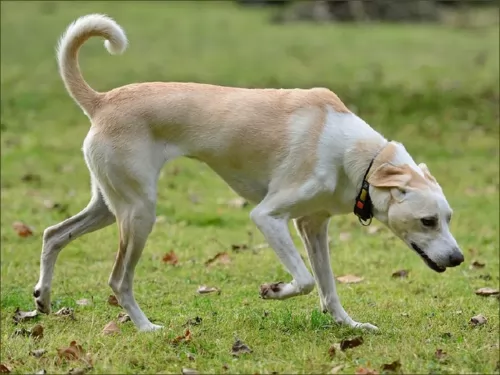 The Cretan Hound is an energetic, curious dog, but when it comes to being a family pet, he is affectionate and gentle.
The Cretan Hound is an energetic, curious dog, but when it comes to being a family pet, he is affectionate and gentle.
He is a reserved dog around strangers. He likes to be busy and will love his walks and games with his human family members. He is smart so is readily trained and he likes to be obedient and to please.
The Cretan Hound will live in harmony with other dogs in the home and they’re also patient and good around disciplined children who have learned to respect animals.
Provide your Cretan Hound with his fair share of love and attention and he will go out of his way to be a loyal and loving family friend.
 Bred to herd and guard cattle against the wolves and bears, it is a very dominant, self-assured, breed. They are intelligent yet laid back when no threat is suspected. They love children but can be hard to train. A dominant adult is needed to train and control the Ciobanesc de Bucovina. They are quite protective of their families and will patrol the property if left outside at night.
Bred to herd and guard cattle against the wolves and bears, it is a very dominant, self-assured, breed. They are intelligent yet laid back when no threat is suspected. They love children but can be hard to train. A dominant adult is needed to train and control the Ciobanesc de Bucovina. They are quite protective of their families and will patrol the property if left outside at night.
The breed has a strong mistrust of strangers but loves his adopted family. Unless threatened the Ciobanesc de Bucovina is calm and chilled. He is loyal, affectionate and dedicated. They attempt to frighten strangers with barks and growls but will attack if necessary. They are also very driven to chase prey so make sure they are in a locked fence. They can be difficult to train and seem to need a strong, alpha adult presence.
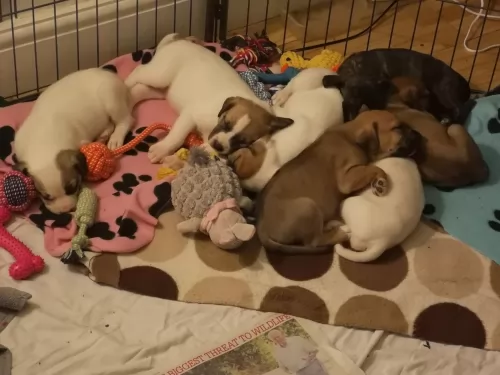 The Cretan Hound is a healthy, robust dog breed, but even so, he can suffer from some common health problems that other dogs are also susceptible to. Some of these are hip dysplasia , cancer, ear infections, bloat and cherry eye.
The Cretan Hound is a healthy, robust dog breed, but even so, he can suffer from some common health problems that other dogs are also susceptible to. Some of these are hip dysplasia , cancer, ear infections, bloat and cherry eye.
Remember that if you don’t want your dog to have puppies, they can actually benefit health-wise from being spayed or neutered. Doing this for your pet can prevent a number of health issues later on down the line.
Make sure too, that your puppy receives his vaccinations in a timely fashion so as to avoid terrible, life threatening illnesses such as parvo and rabies.
 Not much has been done to study the health of this breed so not much is known for certain. It is known that they have good health as they have survived the harsh winters in the mountains while tending to the flocks.
Not much has been done to study the health of this breed so not much is known for certain. It is known that they have good health as they have survived the harsh winters in the mountains while tending to the flocks.
Given their size and the history of mountain dogs, they could be susceptible to visual and skeletal amount of food and at the right times can prevent this. They could be susceptible to arthritis, knee and elbow dysplasia, and cataracts.
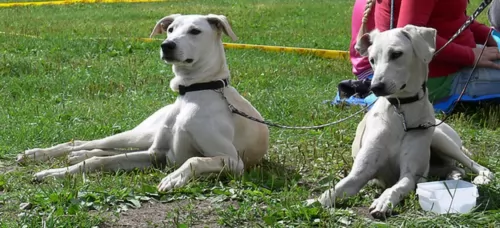 You’re certainly not going to have to do too much grooming with the Cretan Hound as he is a low maintenance breed.
You’re certainly not going to have to do too much grooming with the Cretan Hound as he is a low maintenance breed.
The dog is a short haired breed and an average shedder, so a good brush twice a week will keep the coat free of loose hairs and maintain the condition of the hair.
As with all dogs, the nails as well as the ears must be checked and attended to. The veterinarian can advise you on how to keep his ears clean and free of infection, as prodding around without knowing can damage his ears.
This Cretan Hound has high activity needs. He is energetic and also hard-working, and you’ll need to be taking him on long walks and providing him with some highly energetic playing sessions. Throw ball for him and take him with you when you go jogging or cycling.
 It is important not to over feed or to feed to much at one time. Even though they are large and powerful dogs, massive meals can cause bloat, so you are better off with 2-4 smaller meals per day. Also, don’t feed right before or right after strenuous exercise.
It is important not to over feed or to feed to much at one time. Even though they are large and powerful dogs, massive meals can cause bloat, so you are better off with 2-4 smaller meals per day. Also, don’t feed right before or right after strenuous exercise.
As previously mentioned this breed does not appear to have many health issues. As they developed naturally in the mountains they have not been exposed to many things there.
This was already mentioned but it is a very serious condition and requires veterinary assistance immediately under threat of death.
They can have either hip or elbow dysplasia. Can lead to arthritis of lameness.
This is a calm, even tempered dog not needing a lot of exercise. However, he is a big dog and can get obese without daily exercise. A large fenced in yard would be appreciated and a nice brisk walk every day. They would probably enjoy flyball and leurcatch. Any herding or hunting would be enjoyed.